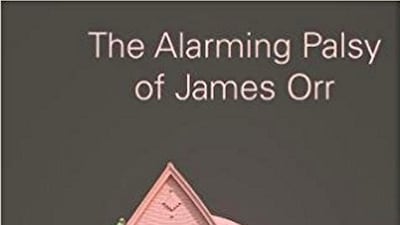James Orr is an ordinary, if unusually well-adjusted, guy: democratic, egalitarian, environmentally conscientious, civic-minded. He is a loving and dependable partner to his wife, Sarah; a dedicated father to his young children, Sammy and Laura; and an assiduous, capable employee in the world of project management. Striving to be a good neighbour and citizen, he chairs a local residents' committee, where he is admired for his organisational energy and interpersonal prowess. He has not taken an unscheduled day off work in two years. He even has human foibles – most notably an apparently benign crush on his friend and neighbour, Connie Fuller.
Yet when we encounter James at the start of this slender, disruptive and chilling novella, these qualities are under siege. Something, he intuits, has changed. James’s first intimation of the transition arrives when he wakes one morning, slightly later than usual, with the sense that there has occurred “some indefinable shift in the natural order of things”. And when he encounters his wife on the landing of the family home, he is confronted with a vision of shock and dismay – “‘Oh!’ said Sarah Orr, and put her hand to her mouth in genuine alarm” – and a clue as to what might really be amiss. Trudging to the bathroom mirror, he finds in its glass a picture of gruesome metamorphosis: the left-hand side of his face has collapsed. It is sliding from its bony scaffolding like melting wax.
The superficial effects of the mutation are extensive. James's skin has become "yellowed, bloodless, and a little shiny"; he has difficulty eating, talking, smiling (his attempts at the last of these issue in something "appalling"); he is unable to move his facial muscles, unable even to blink; and his drooping lower eyelid exposes a horrifying and mercurial eyeball – now parched and in need of refreshment from eye drops; now shedding cataracts of humiliating tears. A trip to the doctor yields a diagnosis of Bell's palsy. James is signed off work to focus on his convalescence, and as he returns with Sarah to the home that it had always seemed their destiny to own, he is filled with an enlivening apprehension of life's "infinite possibility".
It is a sensation that doesn't last long. Faced with an autobahn of solitary days at home, he toys with the idea of pursuing the "ordinary fantasies" – books he hasn't read, friends he hasn't seen, the musical instrument he might eventually learn – he had once dreamed of fulfilling while consumed by work and family. But these he does not pursue. Instead, he takes long walks in the local woods, and finds himself repeatedly drawn to an old folly. When he visits, he sees the signs and registers the presence of a strange man who is rumoured to live there. And although James has never seen him, his visits to the residence routinely imbue him with the suspicion he is being watched.
As the weeks slip by, James’s condition shows no sign of improving. He sleeps in the day and starts to feel that he has been robbed of something ineffable. And his behaviour becomes increasingly violent and erratic, as if he is operating at a single but insuperable remove from reality. He finds himself delivering vicious outbursts at dinner parties and neighbourhood gatherings. He is often unrecognised and misunderstood. And as the strange palsy threatens to overcome him, he rapidly loses his standing in the community.
Behind or around these events loom a number of questions. Is James the man he thinks he is? Are the events he sees real or imagined? What has he done to deserve the contempt and disgust with which his friends and family now meet him?
Tom Lee addresses these questions with great skill and subtlety, and the story he tells casts on the reader a stealthily mesmeric spell. It bewitches you glacially and obliquely, moving from genteel and bracingly perceptive descriptions of suburban life to the imagining of an environment in which time, reality and ethics appear disturbingly out of joint.
Occasionally, Lee's prose can be hackneyed: characters "bite the bullet" and "force the issue". But it is often taught, bright and vivid (children move "with an odd, bustling efficiency, like an insect colony sharing a single, collective intelligence"), and it draws the reader to a denouement that is as coldly brutal as it is psychologically and aesthetically captivating. The Alarming Palsy of James Orr is a resonant, disquieting work that will leave you restless and enraptured, and possessed by the possibility that each of us might one day wake to by greeted by an image not of our imagined self, but by a portrait of the face we deserve.
______________
Read more:
Book review: Han Kang’s latest translated book evokes its titular shade in its prose
Evolution or creation, Dan Brown's Origin lacks creativity
Sinatra’s manager taps into ageing singer’s decline in new book
______________

